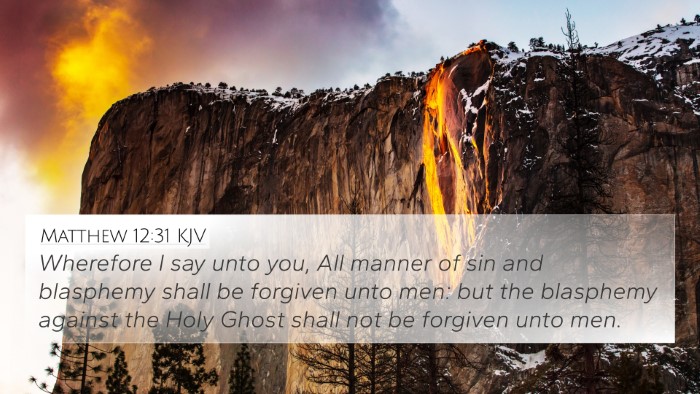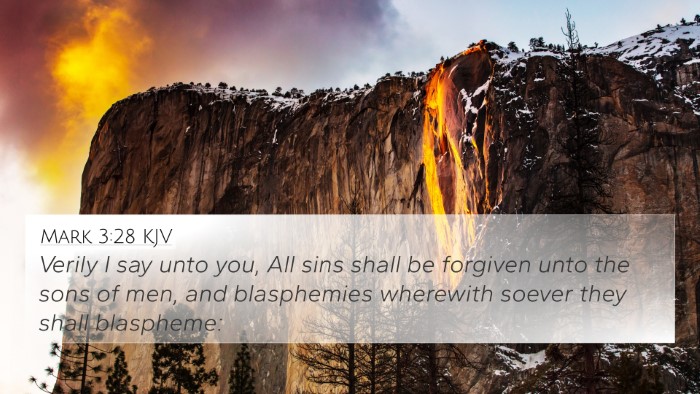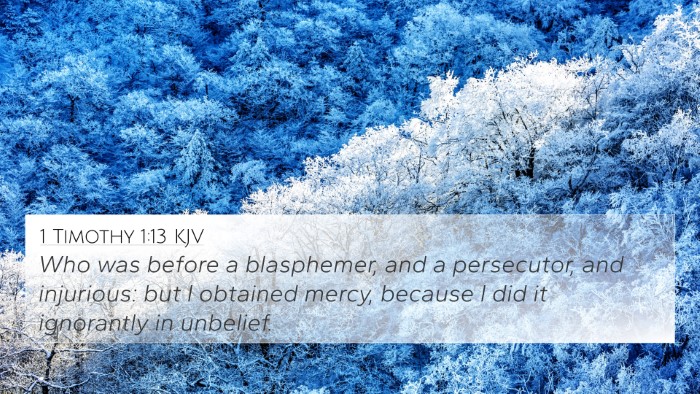Meaning and Interpretation of Luke 12:10
Bible Verse: Luke 12:10 - "And everyone who speaks a word against the Son of Man will be forgiven, but he who blasphemes against the Holy Spirit will not be forgiven."
Overview of the Scripture
This verse addresses a profound theological concern regarding the sin of blasphemy against the Holy Spirit in comparison to speaking against Jesus, the Son of Man. The teachings of Jesus were often met with hostility, and His acknowledgment of this sin emphasizes the gravity of rejecting the work of the Holy Spirit. The essence of this statement brings to light the significance of understanding God’s grace, mercy, and the boundaries of His forgiveness.
Public Domain Commentary Insights
Matthew Henry's Commentary
Matthew Henry posits that this scripture illustrates the distinction between offenses against the person of Christ and the Holy Spirit's influence. While speaking against Jesus can lead to repentance and forgiveness, Henry cautions that rejecting the Holy Spirit constitutes a more severe transgression—essentially a hardened heart that rejects God's conviction. His commentary highlights the critical nature of the Holy Spirit’s role, describing blaspheming Him as an irreversible act of defiance against divine grace.
Albert Barnes' Notes
Albert Barnes elaborates by explaining that to blaspheme against the Holy Spirit embodies a conscious and willful rejection of God's revelations and truth brought through the Spirit. In Barnes’ interpretation, the forgiveness of the former offenses acknowledges the potential for spiritual awakening and repentance, while the latter signifies a willful blind dismissal of God’s truth, thus leading to a state of unforgiveness. He emphasizes the seriousness of being aware of how one's words and actions align with divine truth.
Adam Clarke's Commentary
Adam Clarke provides insight into the context in which Jesus spoke these words, addressing the Pharisees’ rejection of divine authority. Clarke underscores that to speak against the Son of Man reflects a degree of ignorance while blaspheming the Holy Spirit denotes a deliberate choice against what one knows to be true. He elaborates that this choice leads to spiritual death, emphasizing the importance of aligning one’s heart with God's revelation to avoid falling into such a sin.
Cross-Referencing and Thematic Connections
Understanding Luke 12:10 is enriched by cross-references throughout Scripture. The following list highlights significant connections:
- Matthew 12:31-32 - "Therefore I say to you, every sin and blasphemy will be forgiven men, but the blasphemy against the Spirit will not be forgiven."
- Mark 3:28-30 - "All sins will be forgiven the children of men, and whatever blasphemies they utter; but he who blasphemes against the Holy Spirit never has forgiveness."
- Hebrews 6:4-6 - Discusses the impossibility of restoring those who have once been enlightened yet fall away, emphasizing the dire consequences of rejecting the Spirit.
- 1 John 5:16 - Mentions a sin that does not lead to death, contrasting it with the unforgivable blasphemy against the Holy Spirit.
- Acts 7:51 - "You stiff-necked and uncircumcised in hearts and ears! You always resist the Holy Spirit. As your fathers did, so do you." This emphasizes resisting the Holy Spirit leads to dire consequences.
- John 14:26 - Highlights the role of the Holy Spirit as a helper and teacher, providing context to understanding the gravity of rejecting His work.
- Romans 1:18-20 - Describes God's revelation through creation and the consequences of suppressing that truth, subtly linking it to the rejection of the Spirit.
- 2 Peter 2:20-21 - Addresses the danger of knowing the way of righteousness yet turning away, reflecting similar themes of falling away from grace.
Practical Applications and Reflections
Understanding Luke 12:10 invites believers into deep reflection on the nature of their relationship with God. The following are key takeaways:
- Awareness of the Holy Spirit: Recognizing the work of the Holy Spirit in one’s life is crucial. Believers are encouraged to be sensitive to the Spirit's guidance and correction.
- Importance of Repentance: The potential for forgiveness highlights the need for repentance. Regardless of how grievous the sin, turning back to God in humility leads to renewed grace.
- Understanding God’s Forgiveness: The varying degrees of forgiveness underscore God's mercy, yet they also reveal the seriousness of heart positions towards Him and His Spirit.
- Responsibility of Speech: As believers, there is a call to guard words spoken against others and to speak truthfully about God throughout one's life.
Conclusion
Luke 12:10 serves as a potent reminder of the seriousness of blasphemy against the Holy Spirit and the implications of rejecting God's grace. The scriptural cross-references enrich our understanding, revealing a consistent biblical theme regarding the actions and responses toward God’s revealed truth. As believers, it is imperative to embrace the Holy Spirit's leading and to foster an attitude of receptiveness to divine correction and understanding.
Engaging in comparative Bible verse analysis, thematic connections, and cross-referencing can enhance one’s Bible study efforts, creating a robust framework for interpreting God's Word and applying it in daily life.









